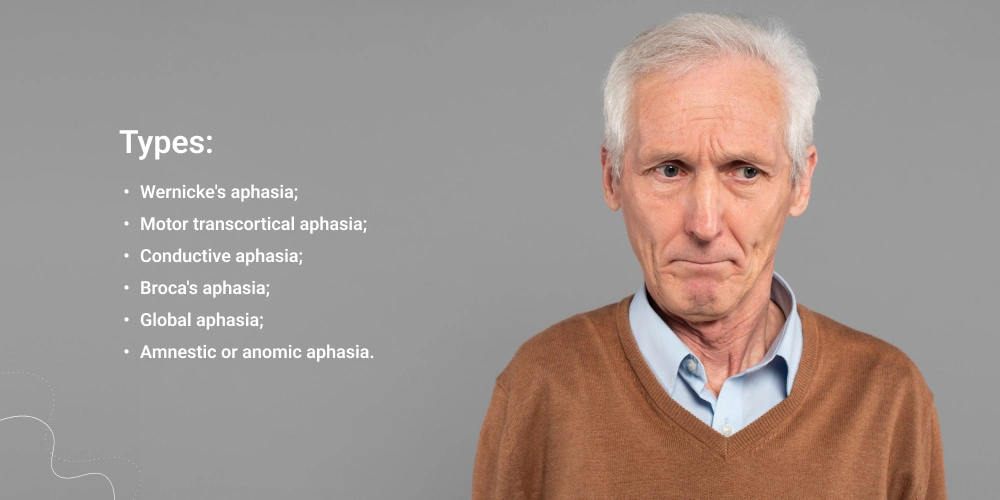Neurology is one of the most mysterious branches of medicine. However, doctors can solve the most challenging diseases with modern medical methods and the latest technologies. One of these disorders is Alzheimer’s disease which can change our brain.
This disease can happen to each of us. After all, it appears regardless of age, gender and lifestyle. Alzheimer’s is known to occur due to the abnormal accumulation of specific proteins in brain cells and intercellular space. It begins with a gradual deterioration of memory and loss of speech due to the appearance of dementia. Thus, this disease progresses and eventually turns into aphasia and dementia.
Dementia is a syndrome that can be caused by many factors, one of which is Alzheimer’s. It is characterized by memory loss. Aphasia is the absence or impairment of speech. People with aphasia start using the wrong words when speaking, and over time, it gets worse.
So, when Alzheimer’s is suspected, the necessary cognitive tests and laboratory examinations are carried out to clarify the disease in more detail.
What is Aphasia?
Aphasia is a neurological disease with which a person has speech problems. And these can be not only pronunciation problems but also trouble with understanding what others are saying. Why do such problems appear? It is connected with the affection of aphasia in some areas of the brain. Although the organs of breathing, vocalization, and speech articulation typically appear during aphasia, the desire to speak is significantly impaired due to damage to the speech centers in the cerebral cortex.
The course of the disease and the rate of development of disorders depends on the reason that caused it. It may be a consequence of Alzheimer’s, after which speech patterns change for the worse. Also, it can occur due to head injuries or certain mental illnesses.
CT scanning and MRI are carried out in neuropsychological studies to establish a diagnosis of aphasia. In addition, it is necessary to consult a speech therapist, who will conduct an assessment and diagnosis of aphasia. It will test language comprehension, speaking, reading, writing, and arithmetic. And then, the diagnosis is established based on clinical symptoms.
The prognosis of the disorder depends on the degree of brain damage and the patient’s age. In general, there are many types of aphasia. So, to determine the specific type, doctors must conduct a head examination to understand in which cortical areas the damage is located. It can be:
- The posterior superior temporal lobe
- The adjacent lower parietal lobe
- The posterior lower part of the frontal cortex
- The subcortical connections between these departments
Damage to any of these parts will result in trouble finding words and speech in general.
Symptoms of Aphasia
The main sign of aphasia is a violation of the speech process. All other symptoms depend on the place of development of this disorder in the cerebral cortex – the type of aphasia. Although each type has different signs and manifestations of the disease, some symptoms are the same regardless of the kind. And among them are:
| Symptoms that affect communication: | Symptoms that affect speech perception: | Aphasia affects: |
| using wrong words when speaking; | difficulty understanding the language of other people; | writing; |
| difficulty naming objects or people; | misunderstanding the meaning of phrases consisting of combinations of words; | reading; |
| the appearance of long pauses in speech; | long recalling of the meaning of spoken words; | understanding; |
| mixing words up; | difficulty after a rapid speech; | talking; |
| steady repetition of words or phrases; | quick forgetting of what is said; | composing words and sentences; |
| difficulty word finding; | misunderstanding of the general opinion of others; | realizing the meaning of what was said; |
In aphasia, symptoms can manifest in different ways. If the disease is caused by immediate damage to the brain, the symptoms will appear suddenly. But if there is gradual damage to the cerebral cortex, the symptoms will appear slowly. When the signs quickly worsen, it can lead to loss of speech due to dementia. In general, dementia, aphasia, and Alzheimer’s diseases are closely related and affect speech patterns. So, it is sometimes difficult to make a diagnosis due to the similarity of symptoms, and doctors must observe additional signs to find out a disease. In aphasia, additional signs may include the inability to control facial muscles.
Types and Causes
The causes of aphasia are diverse, but they all arise in conditions of brain injury:
- Cranioencephalic injury
- Tumors of the central nervous system
- Degenerative processes
- Stroke (the most common cause of aphasia)
- Degenerative diseases (Alzheimer’s disease, Parkinson’s disease, etc.)
- Localized or diffuse brain infections
As you can see, aphasia can be caused by many factors. Accordingly, there are as many types of aphasia as there are causes. There are about 20 types of this disease, but 6 main ones are distinguished among them:
1. Wernicke’s Aphasia
It occurs as a result of a lesion in the left temporal lobe. Symptoms include long sentences containing meaningless, made-up phrases with mixing words up.
2. Motor Transcortical Aphasia
It results from damage to the front upper part of the cerebral hemisphere. Reveals problems associated with a deficit in language production, but language comprehension remains unchanged.
3. Conductive Aphasia
It is caused by damage to the parietal lobe of the brain. This disease is characterized by free, spontaneous language and good comprehension, but with poor repetition, which is characterized by the presence of literal paraphasias.
4. Broca’s Aphasia
It occurs due to damage to areas of the left frontal lobe. The disease is characterized by word finding difficulty and non-fluent expressive language, with poor articulation consisting of short, ungrammatical phrases.
5. Global Aphasia
It is caused by injuries in the areas that control speech. It is characterized by trouble finding words and severe language speech, including speaking, comprehension, and writing problems.
6. Amnestic or Anomic Aphasia
It is caused by damage to any point of the left hemisphere. With such aphasia, there are problems with using the wrong words when speaking and finding them for speaking.
How to Treat the Word Finding Difficulty of Alzheimer’s Patients?
Alzheimer’s disease is a chronic neurodegenerative disease that can not be cured. Over time, Alzheimer’s speech patterns manifest themselves worse, usually happening in the last stages of the disease. Unfortunately, there is no medicine to cure or slow down this disorder. However, doctors have some methods for practicing every day to alleviate the difficulty of word finding:
- Support therapy
When diagnosing Alzheimer’s, doctors prescribe appropriate drugs to prevent the disease from progressing. If you strictly follow all the doctor’s instructions, you can preserve the independence of performing everyday skills and improve your memory gradually.
- Read every day
Daily reading helps to increase vocabulary and facilitates speech production during communication. It also helps to find the appropriate words in the conversation faster.
- Create a healthy diet
Eating healthy foods is crucial for maintaining good health. Adjust your diet and eat foods that promote brain activity. For example, apples and nuts will help with such trouble as finding words.
- Develop hand-eye coordination
Engage in some creativity. It can be knitting, drawing, or gluing paper figures. Such activities develop fine motor skills, which are important in Alzheimer’s disease.
- Use the alphabet
Choose any letter from the alphabet and come up with as many words as possible for this letter. It will help transfer terms from your passive vocabulary to your active language.
The practice of such methods will not allow the disease to progress to a worse stage and help to cope with such a problem as using wrong words when speaking.
Prevention of Aphasia
It is impossible to cure such a disorder completely, but there are various preventive therapies to relieve symptoms and improve speech. Prevention of aphasia depends on its type and severity of symptoms. If a person loses speech due to dementia, the treatment will be longer and more challenging to perform. If aphasia is just starting to appear, therapy can restore language skills more quickly. So, sometimes a specific type of aphasia may require speech therapy. It includes:
- checking communication skills;
- analysis of pronunciation problems and their solutions;
- performing exercises to improve pronunciation;
- learning to use gestures and communicate using a computer;
- working out issues with the pronunciation of certain sounds.
If we talk about the general prevention of aphasia, the following tips can alleviate the disorder:
- Eat healthy food;
- Maintain an average body weight;
- Avoid head injuries;
- Do sports or devote at least 30 minutes of physical activity during the day;
- Do not drink alcohol or smoke;
- Take regular tests to monitor changes in the body;
- Do exercises to train your memory and improve the functionality of your brain.
By the way, such preventive methods can be helpful both for aphasia and dementia. Prevention is carried out in order to help a person be independent of their condition and not worsen their health. Also, it contributes to maintaining health and restores the level of functionality before the injury.
Conclusion
Scientists worldwide look for new ways to recognize Alzheimer’s disease before the first behavioral symptoms appear. But unfortunately, until now, scientists have not invented drugs to get rid of this disease forever or at least slow it down. Alzheimer’s, aphasia, and dementia have wide varieties, making researching these disorders even more difficult. Previously, such diseases were only in the elderly, but now they can happen to anyone at any age. Alzheimer’s speech patterns can manifest in different ways. In some, it can be worse; in others, it is better. Therefore, when such disease occurs, there is only one way out: correctly selected therapy by a doctor.
FAQ
- Does aphasia always lead to dementia?
Yes. Primary progressive aphasia is a type of frontotemporal dementia, a group of related disorders. This condition progresses slowly, becoming noticeable only when the symptoms become pronounced. People with primary progressive aphasia may lose the ability to speak and write or understand spoken language.
- What type of dementia affects your speech?
It can be frontotemporal dementia, characterized by damage to the brain substance in the frontal region and frontal segments of the temporal lobes. As a result, it has a terrible effect on the speech. It is even worse than Alzheimer’s disease.
- What stage of Alzheimer’s is loss of speech?
It is manifested in the last stages of this disease. At this stage, people lose the ability to communicate normally. They can not form sentences, pronounce words and speak intelligently. Although sometimes they manage to say a word, people with such symptoms definitely need the help of other people.
- What does it mean when a dementia patient stops talking?
This human condition is known as aphasia. It is expressed in the inability to speak and understand the language by ear. It is most common in the elderly and can be caused by stroke, Alzheimer’s, or traumatic brain injury. And it is only one type of aphasia because there are many of them.













Please, leave your review
Write a comment: